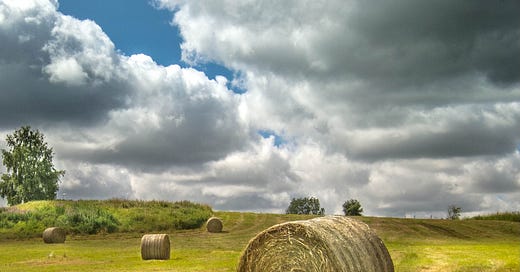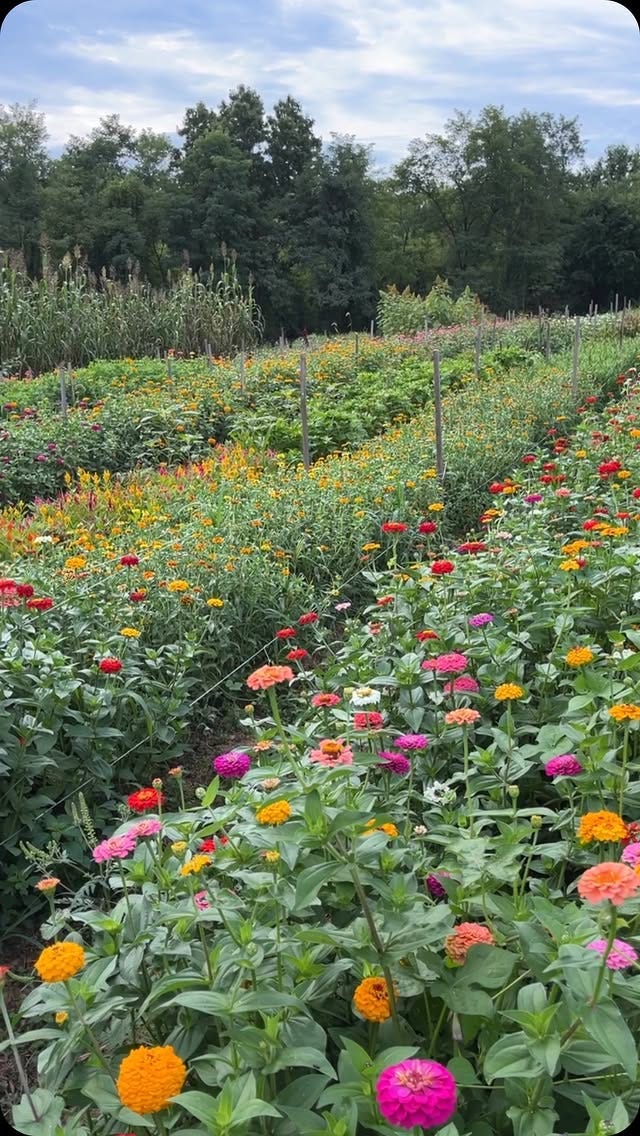
Meet the farmers suing Trump over climate change data and money
Farmers say the Trump administration is wrongfully withholding crucial data needed to plan crops and holding up money they were promised to help their small businesses grow.
(Editor’s note: Are you a federal employee who works on environmental or energy issues and want to talk about what’s happening? Landmark has the secure messaging service Signal. Send us a message.)
Like many farmers across the country, Laura Beth Resnick wakes up early to work her small farm outside of Washington, D.C.
Butterbee Farm is the type of small business success story most politicians celebrate. Resnick and her husband started the operation nearly 13 years ago and have diligently built it up since, helping supply weddings and celebrations with dahlias and marigolds in the fall or tulips and freesias in the spring.
After working on leased land for many years, they finally saved up and bought some land two years ago in rural Maryland. It was an empty field, so there was a lot to build: a road to a barn, a well for water and greenhouses to keep producing during the winter to prepare for busy holidays like Valentine’s Day or Easter.
Just before the new year, they finally installed a $72,000 solar panel array on the barn to keep it all running, expecting a federal grant made available by the U.S. Department of Agriculture (USDA) under the Inflation Reduction Act (IRA) to cover half.
But a month later, just about when that grant money would’ve been paid out, Donald Trump became president. And on his first day in office, he signed an executive order that effectively froze IRA funds — including funds that were already obligated and expected by farmers like Resnick.
All that has left Butterbee Farm in limbo. Resnick said they are unable to continue growing their business, and they may not be able to hire as many farm hands to help get through the busy season this year. The uncertainty means she and her husband can’t even put aside money for retirement as they planned to do after years of focusing on the business.
“We basically can’t do anything but the bare minimum that is required for business,” Resnick told Landmark.
Resnick is one of many farmers across the country who have been impacted by Trump’s sweeping cuts to climate-related programs. And she’s one of many who are now fighting back in a pair of lawsuits seeking to force the Trump administration to backtrack.
In Resnick’s case, farmers and nonprofit groups operating across the country — including a woman- and Black-owned farm in Mississippi and an organic farm in Massachusetts — claim the USDA’s withholding of federal IRA grant funds violates several core constitutional principles.
The “indefinite and indiscriminate funding freeze,” they claim, violates the Constitution’s separation of powers provision, its Take Care clause that requires the president to faithfully execute the laws passed by Congress and is otherwise “arbitrary and capricious.” Like Resnick, the other farmers and nonprofits were approved for grants under the 2022 IRA — the largest climate bill ever passed in the U.S. — that require the recipient to pay for the project up-front before being disbursed later. They’ve contracted with installers, spent a lot of their own money and many took out loans they will struggle to repay.
In another lawsuit, farmers are targeting the USDA’s purge of climate-related data from government websites. Information taken down from those sites includes datasets and interactive tools, as well as information about climate-smart agriculture, forest conservation and climate change adaptation.
They claim the government can’t hastily remove documents from the public eye at its discretion, and doing so violated the Administrative Procedure Act and other federal administrative laws.
“I think all farmers are really on the front lines of climate change. Their livelihoods are really directly impacted by climate change, extreme weather events, droughts and wildfires,” said Jeffrey Stein, an attorney at Earthjustice who represents farmers in one of the lawsuits. “Purging climate change web pages doesn't change that stark reality.”
Wes Gillingham, one of the plaintiffs in the second lawsuit, grows over a hundred varieties of vegetables in New York’s Hudson Valley including spinach, radishes, green beans, carrots and sweet corn. He also has about 30 acres of grazing land on top of that.
Gillingham said that farmers are intimately familiar with the impacts of climate change, and rely on the USDA’s information to plan out springtime planting and to prepare for potential big storms.
Some of those impacts: New York’s moisture levels have fluctuated greatly from having as much as 60% more moisture than it historically had to more recent and “wicked” droughts, Gillingham said. And seasonal shifts are changing the times of year fishermen can harvest.
“All that fluctuation and the extreme weather events are something that farmers know firsthand and need every piece of information to adjust to,” Gillingham said. But instead you have an administration that is purging websites because they’re using the term climate change, and it's freezing … climate smart funding.”
The lawsuits are both proceeding, though there are little signs that the funds or data will be returned voluntarily. In the meantime, other agencies like the U.S. Environmental Protection Agency are also attacking IRA funding, including over $20 billion in grants for low carbon technology that had already been awarded.
A hearing on preliminary injunction in a consolidated case challenging that freeze was held earlier this month, and a decision is pending. Farmers in the climate data case against the USDA also filed motions for preliminary injunctions late last month.
The USDA announced in late March that farmers like Resnick could still receive their funds if they indicate how their projects will comply with Trump’s energy-focused executive orders. The farmers and their lawyers have said the USDA’s announcement is a “stunt” that only serves as an opportunity to deny farmers their grant money.
For now, the farmers are stuck waiting.
“It's really, really bad timing in the big picture of things because we need to deal with climate now,” Gillingham said. “This is the worst time of the year to pull funding from farmers, when they're planning what they're planting and adjusting their operations.”











